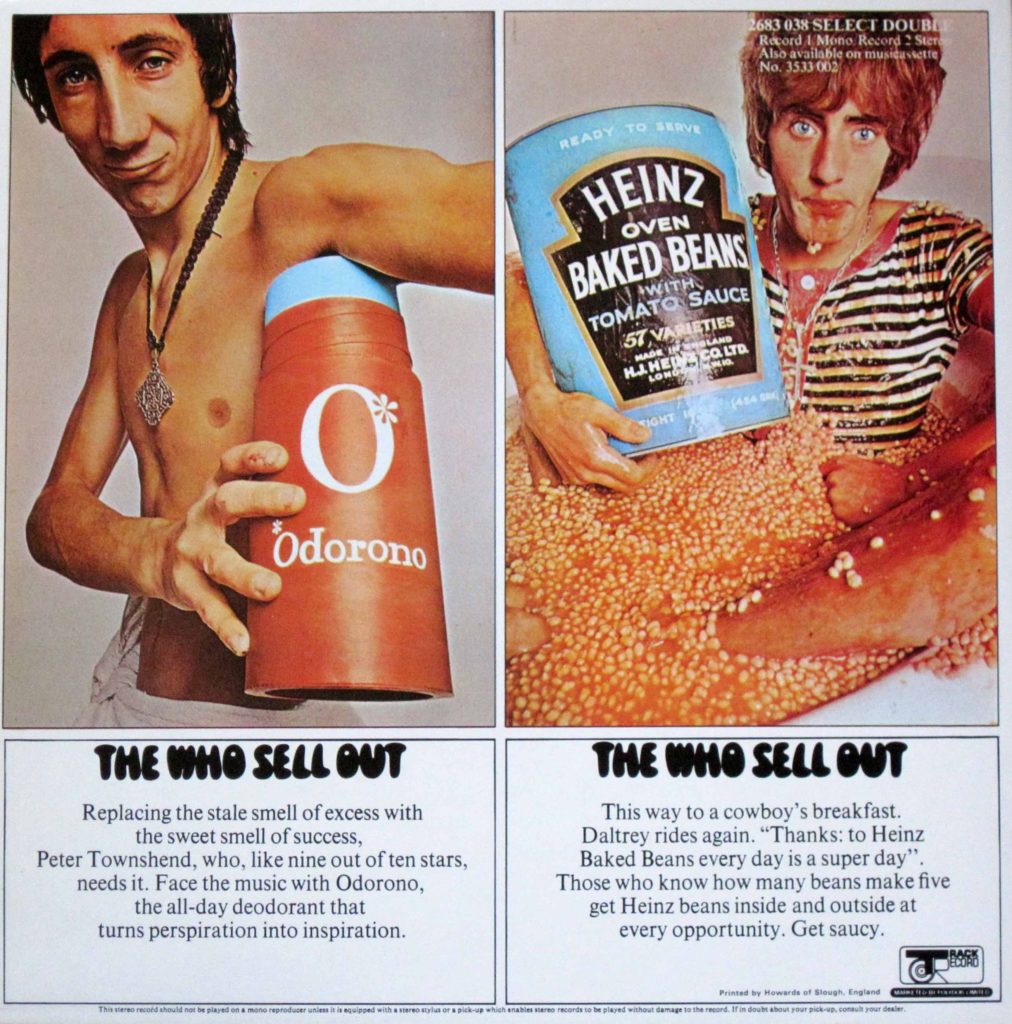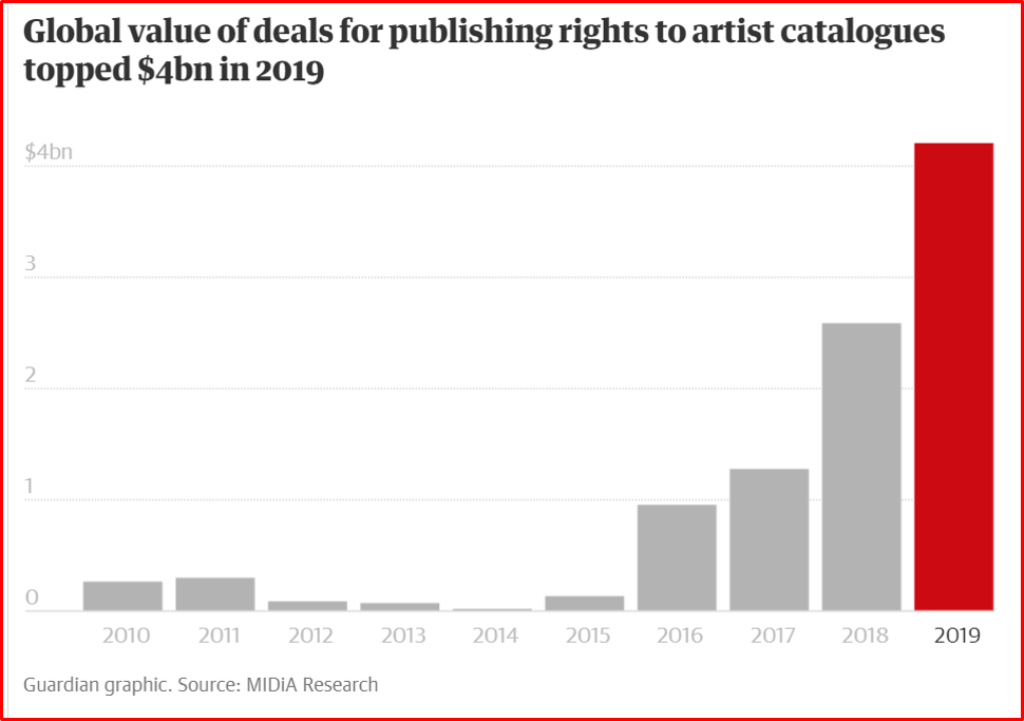
The illustration above is actually the album art (back when there was album art) for The Who Sell Out, released 53 years ago today.
The album stirred up controversy, containing actual commercials in between tracks. Among others, “I Can See For Miles” was released on this album. And the art work became famous, standing out in very Who-esque way. That’s a very young Pete Townshend on the left, and Roger Daltrey on the right.
The interesting thing is that the concept behind the album – “selling out” – is a phrase that is as antiquated today as other slogans and sayings from the ’60s, like “It’s a gas” and “Far out” – the stuff of Cheech & Chong movies.
But a half century ago, back in those glory years of rock n’ roll, the notion of “selling out” was a thing. It meant deviating from and even prostituting your art – especially your music – by heading off to greener, more mainstream, mass appeal pastures. Along the way, a number of artists were painted with the “sell out” brush, making it difficult for them to regain their cred among their core fans.
In today’s world where even our letter carrier is a brand, it is seemingly impossible to “sell out.” Everything is packaged and marketed. It is a positive to be an influencer, hawking your wares to your “friends” on social media. In fact, the more you “sell out” – or sell stuff – the more successful you are, whether it’s downloads, likes, subscribers – you name it.
 And yet, that’s the phrase that came to mind last week when perhaps the most “righteous” (there a quaint old term), seminal artist from the 1960’s – Bob Dylan – announced he was selling his entire catalogue to Universal Music Publishing Group for a hefty $300 million. Universal’s CEO, Jody Gerson, engineered this mega deal.
And yet, that’s the phrase that came to mind last week when perhaps the most “righteous” (there a quaint old term), seminal artist from the 1960’s – Bob Dylan – announced he was selling his entire catalogue to Universal Music Publishing Group for a hefty $300 million. Universal’s CEO, Jody Gerson, engineered this mega deal.
Of course, selling his music is Dylan’s right. It’s his music. Next year, he turns 80 – old enough to know how he wants to spend his money and his time.
And as we’ve learned from Taylor Swift’s ongoing battle with Scooter Braun and Big Machine, it IS about owning your music.
Perhaps, Prince said it best: “If you don’t own your masters, your masters own you.”
Until you sell them, that is.
And to celebrate this historic transaction, The Economist – a publication that knows a great deal about buying and selling – found Dylan’s deal the perfect moment to jab the artist. They wrote new lyrics to Dylan classics, all of which poked (mostly) fun at this mega-deal.
Many of the rewritten songs are delectable, but the opener from “Mr. Tambourine Man” stood out for me:
Hey! Ms. Universal, Ma’am, play my songs for me
In the clouded covid mourning I’ll sell ’em all to you
My weariness amazes me, I’m branded on my feet
I have no one to sing to
And the ancient empty street’s dead set for streaming
Dylan’s laughing all the way to “Maggie’s Farm.” Actually, he may decide to buy it.
As has been his reputation when he first hit the scene, Dylan’s move may prove to be eventful and groundbreaking. A story in The Guardian by Mark Sweney reports that Dylan’s financial dealings for his catalogue may in fact be as trendsetting as a pro free agent who paves the way for others to cash in.
In “Going for a song: why music legends are lining up to sell their rights,” Sweney points out that between COVID-19 on the one hand and a high-profile deal like Dylan’s on the other, artists selling off their music libraries might just become a trend.
Take David Crosby, for example, a guy who’s been there and done that with the Byrds, and in various collabs with Stills, Nash, and Young. In a recent tweet, he blamed his (mis)fortunes on the inequity of streaming royalties, as well as the inability to tour during the pandemic. His equity is in his music.
I am selling mine also …I can’t work …and streaming stole my record money …I have a family and a mortgage and I have to take care of them so it’s my only option ..I’m sure the others feel the same https://t.co/EXWHR2v6iq
— David Crosby (@thedavidcrosby) December 7, 2020
This wouldn’t have been the first story of a celebrity squandering a fortune – or at best, grossly mismanaging it.
Consider the mess the assets of both Prince and Aretha Franklin are reportedly in after their celebrated passings. Back in April, Hour Detroit ran this story, “The Battle for Control of Aretha Franklin’s Estate Shows No Sign of Ending,” detailing the Queen of Soul’s posthumous maze of financial affairs and money debacles.
Even music insiders may not have realized publishing rights has become a $4 billion dollar business with indications it will now go even higher. The Guardian story included this telling chart from MIDiA Research:

As the data clearly shows, this was a more than just an emerging trend in 2019 – it was already a huge sub-industry for success for musicians, writers, and performers. And thanks to COVID and the fraternity (and sorority) of aging artists, it may just come down to smart financial planning for artists, but thanks in no small part to Dylan’s big deal with Universal, it just makes sense.
Apparently, that’s what may motivate Dolly Parton to dump all or part of her catalog. Estate planning and taking care of the family long after musicians are on stage or for that matter, on this earth. You won’t be surprised to know popular musicians are far more likely to die younger than the rest of us.
And perhaps having cash on hand might be part of the motivation for why Dolly stepped up this year, investing a cool million bucks in COVID vaccine research. It was reported last month her contribution was a difference maker in funding the Moderna vaccine, which will likely be approved soon. Money well spent.
It’s not stopping there. The Guardian’s Sweney also points out Steve Nicks recently sold off a piece of her music assets for a cool $100 million to publisher Primary Wave. And it’s not just Classic Rockers. Younger artists have gotten in on this publishing bonanza, including the Killers and Imagine Dragons.
So is it just another form of “selling out?” For guidance, I turned to the most knowledgeable music maven I know, Gary Graff (pictured right). He’s  an author, journalist, music critic, and a radio broadcaster on the Bob & Brian Show on Saga’s Hog in Milwaukee. Gary emphatically sees this wave as being nothing new:
an author, journalist, music critic, and a radio broadcaster on the Bob & Brian Show on Saga’s Hog in Milwaukee. Gary emphatically sees this wave as being nothing new:
“The ship has sailed on the whole notion of rock ‘n’ rollers ‘selling out’ – maybe even before Jefferson Airplane did a spot for Levi’s.
High-minded as we might want it to be, rock is still a form of pop music. The idea, even among the hipperest than thou is to build an audience and sell the music and try to make a living. You can define ‘sell-out’ in any number of ways, and then rationalize any of them right after that. It amounts to the same thing.”
But what about Dylan? As the subtitle in The Economist story reads:
“Selling your catalogue makes sound commercial sense. But it may not always fit the brand.”
By doing the deal with the devil – in this case, Universal – does Dylan run the risk sullying his carefully cultivated brand image by selling off American standards like “Blowin’ In The Wind” and “Like A Rolling Stone?”
Gary Graff says no:
“In the case of Dylan and others selling their publishing, it’s perhaps the strongest ultimate act of an artist’s own control and exercise of free will over their material. They’re making their own freewill choice and deciding how they want their songs to live on in perpetuity. They’re the only ones who have the right to determine if they no longer need to exercise that level of control over the music and how it’s used, and they have every right to cash in like a lotto winner taking the single payout.
The onus now is on the buyers and whether they will curate these catalogs with care and taste moving forward.
Don’t bet on it.”
I’m confident the box sets will be ready in time for the holidays – this year, and down the road.
So, let’s not lose any sleep over this one. Instead, turn up the music.
And pass the baked beans.
Thanks to Ed Cohen for the inspiration (and password).
- Like A Pair Of Old Jeans - April 2, 2025
- What’s Fair Is Fair - April 1, 2025
- What’s On Your Bucket List? - March 31, 2025




One thing you didn’t hit on is the change in tax laws and as the WSJ points out, Biden’s proposed 39.6% rate for taxing capital gains. Now is just a good time to sell.
https://www.wsj.com/articles/bob-dylans-catalog-sale-highlights-a-tax-advantage-for-songwriters-11607682604
Besides, we all love to think of Mr Zimmerman as a paragon of something or another, but in his own words, he’s just “a song and dance man.” The man can’t tour due to covid, something he’s been doing non-stop for years and as your article pointed out, his income stream has got to be hurtin’. After all, he’s just a human and how many years does he and (we of his generation) have left? The ‘sell out’ ? Just something to leave his grandkids.
Right on all counts. I left out the capital gains piece, but financially, selling your music publishing rights (or your Apple or Tesla stock) in 2020 looks to make more sense than waiting around.
And then there’s the concept of Dylan’s iconic brand, something that may be more fixed in the minds of his fan than something of his own making.
Appreciate the insightful comment, John.
Joni Mitchell has famously advised music composers never to sell their publishing rights, and clearly she’s the beneficiary of her own advice. But given her recent health problems I wonder what her current thinking is.
Age – and health – have a way of changing your perspective. I saw a photo of her at an event recently, accompanied by James Taylor. I’m sure many artists are thinking about how their families will fare after they’re gone. Thanks, John.
Music is a tough way to make a living – it always has been and more roadblocks present themselves year after year. That makes it hard for me to begrudge Dylan or any artist for finding a way to monetize their work.
Music is a tough way to make a living (I know I said that already) and only getting tougher. Maybe that’s the real story behind catalogue sales. History is rife with stories of artists who were screwed by labels, managers and promoters. The DMCA has pretty much eliminated recorded music as a revenue source for artists and even the streamers can’t make a serious ROI with the current arrangement. It takes about 350 million streams to generate a million dollars for the artist.
The business model for music has always depended on/leveraged artists love of music and dreams of earning a living at it and in turn, suborned some horrible metrics and practices. The successful artists (a very small percentage) like the system just fine, but the overwhelming majority of them have no trade organization, no one to lobby on their behalf and no money to influence politicians.
In these times, it’s hard to imagine Congress prioritizing leveling the playing field between artists and the entities that feed off of them – maybe they can think of it as another form of Covid relief. They could call it the On Your Own, No Direction Home, Complete Unknown artist relief bill.
So if Bob Dylan wants to sell his catalogue…fine with me. The times they are a changin.
This is a strong observation here, Bob. You won’t get an argument from me. With the exception of those at the top of the pyramid – than handful of superstar artists – the other 98% are struggling in this environment. (Sounds a lot like podcasting.)
And even an iconic performer like Dylan (or Stevie Nicks or Dolly Parton) need to plan an “exit strategy.” As Gary Graff reminded us, hopefully, those who buy these catalogues will be great stewards.
Money makes hypocrites of all all.
There are only two people I know of that put their principals in front of money (Bill Waterson, creator of Calvin and Hobbes, and Bob Barker, former host of Miss America pageant). There may be two or three more I don’t know of, but the list is small.
On top of that, there is not a generation more hypocritical than Baby Boomers but of course, Millennials and Gen X haven’t had the chance to betray their ideals yet so we will wait and see if they give us a run for the money.
Bob Dylan himself is a creation and has constantly changed clothing, religions and personas to be as mysterious as he wants to be. He doesn’t want to be figured out and he is well beyond mere mortals anyway. I don’t think he is selling out in the least because he never said he wouldn’t. He has always fought against the roles others have put on him and he happily likes to confound people.
Selling his catalogue doesn’t shock me at all and is not outside my conception of Terry or Timmy or Bobby or Zimmy. After all, Germany may make your beer, but Bob wants you to know Chrysler will make your car.
I read a comment once from Jeff Tweedy where he talked about licensing Wilco’s music. He said he couldn’t tell his father, who worked on the railroad all his life, that he turned down more money than he ever made in three years because of his “artist sensibilities”. He essentially said that artistic integrity was a rich person’s conceit.
I understand that. Today’s artists don’t have sponsors to take care of them like Mozart.
The whole issue depends on the person, their statements and the pretense on which they carry themselves. Most artists today are packaged products to begin with so it doesn’t matter that Lady Gaga sells razors. Even Elvis, who always proclaimed he would perform whatever was successful, was a product and would be singing duets with American Idol cast offs if he was still around.
I would feel different if Suicidal Tendencies sold “Institutionalized” to Pepsi though.
Outside of music, it is the difference between talented authors like J.K. Rowling and J.D. Salinger. Ms. Rowling can’t sell out because her intention was to commercialize her characters from the beginning but it would be odd if Mr. Salinger had used Holden Caulfield to sell Johnny Walker scotch.
Mike, thanks for the thoughtful comments. Dylan is an enigma, as you allude to, in that he has has worn many outfits over the years. He has cultivated that mysterious image, and fans (and critics) have summoned their own interpretive skills to explain what those lyrics really mean. He has cleverly mastered the craft of being confounding.
I get what you’re saying about Suicidal Tendencies, and I’m trying to get my head around Holden Caulfield hawking scotch. for me, it would be like Tom Waits selling Lucky Strikes. Thanks for taking the time to add to this conversation.
“He has cleverly mastered the craft of being confounding.”
I’m going to steal that line – thanks.
I also going to steal the Tom Waits selling Lucky Strikes analogy too. Or maybe I’ll switch it to Tom selling Maxwell House as a great “cup of mud”.
Steal stuff??? I thought I was the consultant.
Bowie Bonds 1997 ~ $50M ~ bought his masters back from Tony Visconti ~ Bowie Sound and VISION!
Yup, that was the conventional wisdom twentysomething years ago. Today, the realities of the economy and COVID may be changing that. Thanks for reminding us, Bruce.